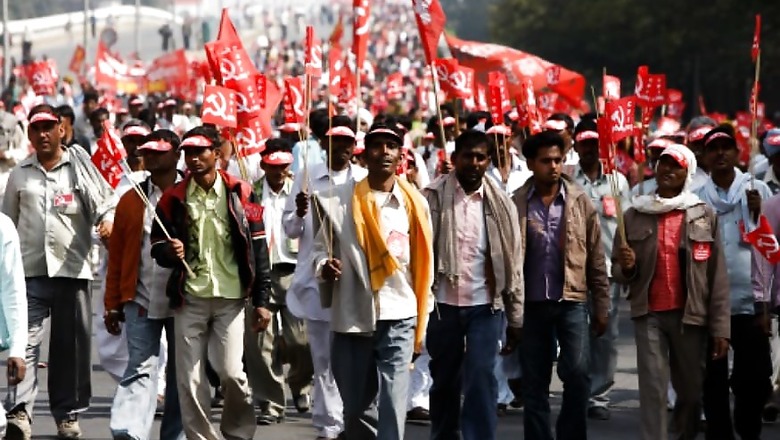
views
With a vice-like grip on institutions (especially the academia and the press), the Left has been working overtime to damage the reputation of the nationalist stream. Its propaganda machinery manufactures facts and makes dangerous attempts to show ‘Bharatiya’ identity in poor light. The pride in being 'Bharatiya' and ‘Bharatiyata’ is ridiculed and rationalised. The communists have a deep and sinister design. They have a past of shaming ‘Bharatiya’ so that nationalism is looked down upon.
Such is the force of their propaganda, perpetrated by committed card-holding intelligentsia, that the communists have been successful in making us believe that but for them ‘Bharat’ would not have achieved Independence. However, their subversive role during the freedom struggle and even afterwards has not been allowed to come out in the open, thanks to their well-oiled machinery, which would give Joesph Goebbles, Nazi Germany’s Minister of Propaganda, a run for his money.
Much has been said and written about the purported role played by the communists during the struggle for Independence, glossing over the fact that Indian communists have always had a very uncomfortable relationship with nationalism. Nationalism as a concept was alien to communism. For a communist, ideology comes first before country. For several years, they had difficulty accepting India as a single country. They used to call India a confederation of nations. So, as far as their report card related with Indian nationalism is concerned, it is very poor. On internationalism, their score is irrelevant since a world communist revolution is not even a pipe dream after the collapse of socialism and the exposure of the many crimes of the socialist regimes in Soviet Russia, Eastern Europe, China, Albania, under Pol Pot in Cambodia and so on.
Coming back to the dubious role played by the communists during the freedom struggle, it can be gauged from the fact that all national heroes were called names. Even Mahatma Gandhi and Subhash Chandra Bose were not spared. They were dubbed traitors. A communist party convention, held in Mumbai from May 23 to June 1, 1943 came out denigrating the Congress. Subhas Chandra Bose was called a Fifth Columnist.
Eminent nationalist and revolutionary Vinayak Damodar Savarkar was made a scapegoat by the Indian intelligentsia, which consistently named and shamed him for being released under a general amnesty order in 1921. The Left-leaning intellectuals have falsely called it a ‘mercy petition’. Toeing the line dictated by Stalin, the communists sabotaged the Quit India movement, refused to accept India's freedom, started an armed rebellion against the Indian state and even after Independence, continued with this position by siding with China in the Sino-Indian conflict in 1962.
However, the most subversive role of the communist movement has been providing philosophical and intellectual underpinning to all such anti-national movements. The CPI leadership supported the two-nation theory and the demand of a separate nation by Muslim League.
Communists’ role in sabotaging the Quit India Movement is well known but has been hushed up and it is thus necessary to trace back what happened during those tumultuous years so that the real truth comes out.
Denouncing Independence and collaborating with the British
The communists were never part of the Quit India movement. The CPI was officially against the Quit India movement. What needs to be emphasized here is that Indian communists did not base this decision of the CPI on any understanding of the Indian situation. The opposition to the clarion call of 1942 was the outcome of a diktat emanating from Moscow. When Hitler attacked his erstwhile ally, the Soviet Union, in 1941, the fight against Nazism overnight became a People’s War for all communists. The directive from Moscow was carried by Achhar Singh Chinna, alias Larkin, who travelled from the Soviet Union to India with the full knowledge of the British authorities. In India, it meant communists had to isolate themselves from the mainstream of national life and politics and see British rule as a friendly force since the communists’ “fatherland”, Soviet Russia, was an ally of Britain. A critical decision affecting the strategic and the tactical line of the party was thus taken defying national interests at the behest of a foreign power, whose orders determined the positions and actions of the CPI.
This has been also supported by the argument of K.K. Chaudhari in his Book Quit India Revolution: The Ethos of Its Central Direction:
Chaudhari says that "on many occasions the Communists were indeed more royalist than even the King of England". In submissions to Sir Reginald, Joshi showed what a splendid job he and his party were doing to break up the Quit India Movement. Chaudhari writes that the 120-page report "could not have been improved by any other collaborator of the British or by any quisling". Joshi was so anxious to prove the CPI's utility to the British rule that he claimed that he was doing a better job of stemming the Quit India Movement, of denouncing Subhas Babu and leaders of the Congress underground than the government itself! Notes Chaudhari: "The tone and contents of Joshi's performance report reveal crystal clear what the CPI had done to sabotage the 1942 movement."
Mahatma Gandhi in his letter to communist leader P C Joshi also raised the issue of information given by the communist leaders to British authorities which in turn was helpful arresting many labour leaders.
A Glimpse through Mahatma Gandhi's Letter
His letter to Communist leader PC joshi on June 11, 1944 on how ‘Communist Betrayed Labour Leaders: Role of Communists’ was so illustrious that even Mahatma Gandhi got wind of their deeds. In his letter to communist leader PC Joshi on June 11, 1944 Gandhi himself talked about the Communist party helping the authorities arrest the leaders of labor unions.
"MY DEAR JOSHI,
I had expected a prompt reply to the questions I had raised at our meeting. Meanwhile some additional questions have arisen which please, answer when you answer my first questions.
1. What is the meaning of “people” in “people’s war”? Does it mean war on behalf of India’s millions, or the Negroes in East, South or West Africa, or the Negroes of America, or all of them? Are the Allies engaged in such a war?
2. Are the finances of the Communist Party, represented by you, subject to public audit? If they are, may I see them?
3. It is stated that the Communist Party has actively helped the authorities to arrest leaders and organizers of labour strikes during the last two years.
4. The Communist Party is said to have adopted the policy of infiltrating the Congress organization with a hostile intent.
5. Is not the policy of the Communist Party dictated from outside?
Yours sincerely,
M. K. GANDHI
The tone and tenor of Gandhi’s letter leaves no manner of doubt that even a person like him, who believed and practised in accommodating divergent views was shaken by the role played by the Communists in subverting the Quit India Movement.
The fact that their integrity was questioned has also been attested by the correspondence between P C Joshi and Mahatma Gandhi. These correspondences can be accessed from this link
http://www.gandhiserve.org/cwmg/VOL085.PDF.
The dubious role played by the Communists, who acted as the fifth columnist for the Britishers is also documented by Bhulabhai Desai (M C Setalvad, Builders of Modern India, Bhulabhai Desai, Publication Division, Govt. of India).
Communists role in dividing India and their support to the Two Nation Theory
K. K. Chaudhari corroborates CPI leadership support to the two nation theory and Muslim League’s Pakistan demand, and writes, “By incessant and vociferous repetition Communists proclaimed the thesis that: (1) India was not one nation but a collection of several separate nationalities; (2) the demand for Pakistan is a just and democratic one because Hindus would oppress them in future; (3) the Muslim League itself has become progressive and secular and Jinnah himself was secular and anti-religious and (4) the Congress must concede to the Muslims the right to self-determination." Supporting Jinnah’s demand for Pakistan, the communists argued that secession, far from dismembering the country, would “lead to still greater and more glorious unity of India, the like of which India has not seen in her history.”
Acting on this thesis, the communists also supported ‘Direct action day’ a call given by Muslim League of Jinnah. When M A Jinnah declared that his Muslim League would resort to ‘Direct Action’ on August 16, 1946, Indian communists adopted a uniquely dialectical position. The Muslim League gave a call for a bandh on that day in Calcutta and the League Chief Minister of Bengal, H S Suhrawardy declared a holiday in the State with the obvious intent of facilitating the bandh and all that comes with it. But the communists displayed a reverse sagacity that was hard to match, as scholar and researcher Shantanu Singha writes in his monograph on Noakhali, the leader of the CPI in the Bengal Assembly, comrade Jyoti Basu, in a Press release declared — displaying the quintessential dialectical vision that eventually succeeded in duping many for decades — that “the CPI would try to keep the State peaceful on that day, with a strike where necessary and without a strike where necessary”.
Post-Independence
In 1948, within a few months of India becoming independent, the CPI under the leadership of B.T. Randive launched the line that this freedom was fake (“yeh azadi jhooti hai”), and argued that the situation in India was ripe for an armed revolution. The Randive line led to the expulsion of P.C. Joshi, who believed that freedom from British rule was a substantial achievement and that, tactically, the communist movement would gain by supporting leaders like Jawaharlal Nehru who, Joshi said, represented a “progressive” trend within the Congress. Apart from the inner-party struggle, what needs to be noted here is that the Randive line, which completely misread the national mood, was the direct outgrowth of a policy formulated by the Comintern (or the Cominform, as it had renamed itself), in other words, Moscow. The directive of Moscow to the Indian communists was that Congress should be opposed since it was no more than a satellite of imperialism. The retreat from this line was also sounded from Moscow in the form of an editorial entitled, “For a Lasting Peace”, in the mouthpiece of the Cominform. There was complete distrust between communists and the Congress and this resulted in the sacking of first left government in Kerala led by EMS Namboodiripad by Nehru in 1959.
Another example serves as a stark reminder of how Indian communists opposed every leader who espoused the cause of India or spoke from the perspective of Indian nationalists. In his opus on the refugee and the Left movement in West Bengal, Prafulla Chakrabarti points out how, when towards the end of 1952, Syama Prasad Mookerjee demanded economic sanctions against Pakistan for its role in persecuting Bengali Hindus in its eastern flank and for pushing them out as refugees. The CPI was quick to organise a meeting on October 18, 1952, at Kolkatta’s Wellington square, where participants chanted slogans against the nationalist Mookerjee.
If past is anything to go by their future looks equally dangerous. Their loyalties were never to ‘Bharat’ but to the faraway masters. No wonder the joke was that if it was cold in Moscow (of the USSR days), the communists in India would sneeze.
With their ideology in tatters all over the globe and the nationalist forces growing throughout India, their attacks have become more bitter. Growth in education and people equipped with tools and technology to verify facts, the ideological spread is shrinking by the day. It is, therefore, more relevant to look at their past and the role of the communists to not only show them mirror but also for empowering people towards taking informed decisions.
Author is an advocate and former President of JNU Students' Union.












Comments
0 comment